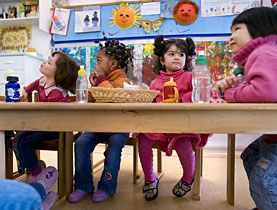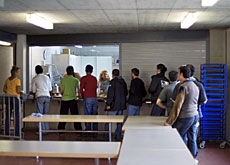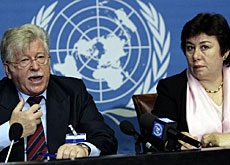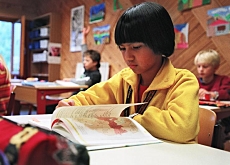City toys with teaching foreign tots German

German language playgroups could become compulsory for immigrant children for the first time in Switzerland under plans by Basel City education bosses.
The canton says it wants to improve the education chances for kids from a foreign home. But kindergarten teachers question how feasible the plan is.
The canton’s education department says children with foreign parents are at a disadvantage during their school years because of poor German language skills. German is the main language in Basel.
“We want to include every child that needs encouragement to learn the language. And we want to involve the parents too,” project manager Herbert Knutti told swissinfo.
Plans to be submitted this summer would require parents to take part in a meeting at which their children’s knowledge of German would be established.
“About six months before children go to kindergarten, we would identify groups by means of a questionnaire to parents about the everyday language use of their children,” Knutti added.
For those in need of support the age of entry into kindergarten would be lowered from four to three years old, and children would take part in playgroups two times a week for a year to improve their knowledge.
Learning through play
Canton Basel City’s school service emphasised children would not undergo any tests and playgroups would be focused on games that promote language learning.
A similar project is running in Zurich but is not mandatory, and the Basel authorities say others already exist in Germany and Austria for children aged four to five.
In Basel half of the youngsters entering kindergarten are foreign nationals and the education department estimates that around a third – around 500 children – do not speak German well enough.
The cost of the playgroups, estimated to be around SFr1.5 million ($1.38 million) a year, would be covered by the canton.
Open questions
Marie-Hélène Stäger of the Association of Kindergarten Teachers said she approved of the idea in theory but had doubts about how feasible it was.
“Education is based on language, therefore I’m in favour. But there are open questions about how it can be implemented.
“I cannot imagine how you make the selection and decide which children can and which cannot take part, who has to take the course and doesn’t have to. This is difficult.”
Parliamentarian Jean-Henri Dunant of the rightwing Swiss People’s Party told the Tages-Anzeiger newspaper it was wrong for the state to try to force children into education at such a tender age. “Three year olds are too young,” he said.
Details on the implementation of the project will be submitted for consultation in the summer.
If approved, teachers in charge of these language groups would first need to be trained. The first courses could be on offer from 2010.
swissinfo
Each canton in Switzerland is responsible for its own schooling, which means there are currently 26 differing education systems in Switzerland
Most pupils start school at the age of seven, after one or two years of nursery school. They usually stay in school for nine years before going on to higher education or training.
Overall, cantons are permitted to take their own independent decisions when it comes to the structure of their education systems, syllabuses and the dates of school holidays.
A Conference of Cantonal Directors of Public Education ensures contact and harmony between the cantons.
There were 1.57 million foreigners living in Switzerland at the end of 2007. The majority, or 960,000, come from EU or Efta states.
Around two-thirds of the total have permanent residency status.
In 2007, more than 10% of newly arrived immigrants enrolled in Swiss schools or institutes of higher education.
German is spoken by 63.7% of the Swiss population, French by 20.4%, Italian by 6.5% and Romansh by 0.5%.

In compliance with the JTI standards
More: SWI swissinfo.ch certified by the Journalism Trust Initiative



You can find an overview of ongoing debates with our journalists here. Please join us!
If you want to start a conversation about a topic raised in this article or want to report factual errors, email us at english@swissinfo.ch.